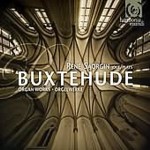Organ enthusiasts will appreciate this reissue of René Saorgin’s Buxtehude recordings from 1967-70, at the time a landmark project for Harmonia Mundi, and whose amazing sound–clear, vibrant, and conveying a realistic presence and power–immediately will nullify anyone’s potential concern about noticeable evidence of age or provenance. These recordings were obviously made with exceptional expertise and care–and as a result today’s listener will have to make no compromise to fully enjoy them.
One of the benefits of this collection (a specially-priced 5-CD set) is that it offers a chance to experience and understand just how original were Buxtehude’s works, especially notable in the Preludes and Toccatas, and also fully on display in the Choral-fantaisie “Nun freut euch, lieben Christen g’mein”. Unlike the later, more formal creations of Bach–awesome, complex, unearthly, yet ever controlled by the hand of genius–with Buxtehude we know there’s an altogether different hand at work, freer, perhaps more overtly daring, audacious, and (importantly) not averse to humor. How else do you describe the playful echo-effect fugue subject in the F major fugue BuxWV 145, or the laughing melody of the Praeludium in D major (the conclusion of Disc 2), its character picked up and developed to stirring effect in the following fugue, a wild and quirky exercise that shows Buxtehude is not afraid to interrupt a perfectly good idea with an emphatically contrasting statement that just as abruptly throws us back to where we left off.
Of course, Bach had his wild and crazy moments too, but Buxtehude often seems like he’s just willing to go wherever the notes and ideas lead, the guiding hand happy to hold very loose on the reins of anything approaching structural formality. This flirtation with improvisational fantasy of course is totally absent from the Chorale preludes, whose particular role in the church service necessitated a more structured, reverential style–and in the process, resulted in some of Buxtehude’s loveliest, most affecting organ music.
Besides being an extraordinary technician, Saorgin is a master colorist and formidable interpreter of Buxtehude’s works. If you want to have some fun, just play the beginning few seconds of each track, just to hear the incredible variety of sounds he employs from one piece to the next. Of course, another reason to spend some time with this collection is to hear the four historic organs–from Alkmaar, Arlesheim, Altenbruch, and Zwolle–the first two of which are contemporary to Buxtehude, the others from the early and mid 18th century. And if you’ve been a collector for awhile, you’ll also appreciate the surprise when you open this very well designed box: each disc, which pops up toward you nestled in its own paper sleeve, looks–and feels–like a miniature LP, complete with real grooves(!) and realistic center labels, purportedly a tribute to the era when these discs were first released. At least as impressive are the excellent notes and documentation regarding music and the organ specifications. Outstanding!
































